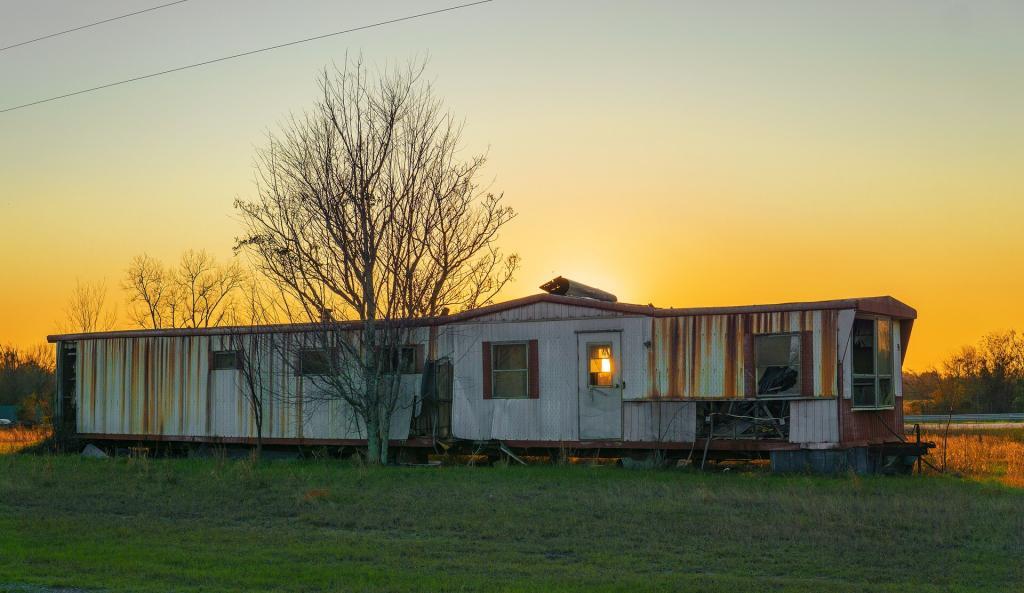Mobile homes are known for being an excellent low-income housing option that allows many people to become homeowners when they otherwise may not be able. There's no doubt that these trailers are a game-changer for so many individuals and families. It's all the more reason why mobile homes have established themselves with a list of common issues. Let's take a look at 10 of the most common problems with mobile homes.

- Plumbing. Because mobile homes are so affordable, one can make an educated guess that cheaper materials are used. Not only are lower quality pipes used for the plumbing throughout the trailer unit, but the underside of the mobile home is exposed. Even in the case of the skirting that surrounds the unit, the bottom of the mobile home is still exposed rather than insulated.
In colder climates, this extra space underneath the home is a liability. To protect your pipes, you must use a strip of flat wrapping called 'heat tape' which is plugged into the electrical system and wrapped heartily across the exterior piping. This will keep the pipes warmer and above freezing temperatures.
Many lot rental leases spell out what would happen in the event of burst pipes due to missing or bad heat tape, and it usually means that the homeowner is responsible for the repairs. Heat tape is fairly affordable, and a wise investment in cold climates for these homes.
- Additions. It's understandable that a growing family may need more space, so an addition is built to accommodate those needs. But if that addition is not built to standards, there could be long-term problems.
Water damage is a common problem with mobile home additions. Leaks can get in through the siding of the trailer itself, which can cause drywall damage as well as electrical issues. The water can spread to the flooring which will cause floor sagging and rotting of the subfloor.
- Insulation. Keeping a home warm in the winter is something that's important not only for the health of the inhabitants, but also for the health of a utility bill. Poor insulation can result in long, cold nights and increasing expenses. As expected, this can be a major issue for those on a low-income.
Below the mobile home is a belly wrap that can become damaged and cause drafts and heat loss through the floor. That's not the extent of the problem with trailer insulation, however. The walls on mobile homes being drafty is a common occurrence.
- Age. Mobile homes don't age well. It may be hard to even give away an older trailer from the 70's in many cases. The reason for less demand for older mobile homes can include the wear and tare over the years, but these 'personal property' items are regulated as well. In many places, you cannot move an older mobile home. If the trailer cannot stay on the land, then it's to be junked/destroyed. Illinois is an example of a state where an older mobile home cannot be moved.
The age of your mobile home can make it very hard to sell...or give away for free. Because they may not be able to be moved, this limits your buyer pool. Not only because those that would want to move it would not be able, but also because a prospective buyer may not like that option being non-existent in the future.
In the event that the mobile home can be moved, it may start coming apart once it hits the road.
- Missing doors. Say what?!? Yes, missing doors. We're not sure why doors would be missing but in many older trailers they are. Keep in mind that there may have been a bunch of people living in that unit over the years, and people have their preferences. Doors may have gotten in the way.
We have seen some missing doors turn up in the outside shed, or tucked tightly into closets. In some cases, we've even found them under the mobile home! Crazy, right?
What makes this mobile home issue even more annoying is that the doors are usually a different size than the standard door, which may have you hopping from one store to the next looking for replacements.
- Sagging and seeping. The ceilings and floors in mobile homes often find themselves with wear and tare to the point that they need to be replaced. Ceilings may sag and bulge in many areas of the home. You can easily replace some drop-ceiling, but what made them sag in the first place?
 You'll find that moisture can get into these homes over time, especially when they aren't subject to regular maintenance. This maintenance issue can be found in these properties very often because it's low-income housing and the inhabitants may not be able to afford such repairs. If the unit is rented, then the trailer park may be responsible for them. In many cases, the parks actually sell the unit with financing though, so the repairs will fall on the homebuyer.
You'll find that moisture can get into these homes over time, especially when they aren't subject to regular maintenance. This maintenance issue can be found in these properties very often because it's low-income housing and the inhabitants may not be able to afford such repairs. If the unit is rented, then the trailer park may be responsible for them. In many cases, the parks actually sell the unit with financing though, so the repairs will fall on the homebuyer.
The floors are also an issue because they are known for seeping in. The underside of the mobile home may have had a flaw in the flooring that allowed moisture to creep in, or there may have been water damage from a ceiling or wall leak. Often times, a roof may be patched but the interior damage is not repaired. Walking in a mobile home that is not subjected to regular maintenance can be hazardous to your physical health.
- Non-working heating and a/c. We've had to replace many mobile home furnaces. In addition, while we haven't too many central air replacements, we have had to service them.
Because trailers are generally a low-income housing option, furnaces and central air units are considered costly for most tenant/buyers. Often times you'll discover work that was done incorrectly if at all. Additionally, items as cheap and simple to handle such as furnace filters are neglected. This doesn't mean it was purposefully so, but rather ignorance of such issues can be the culprit.
Losing heat in the dead of winter can be an unpleasant experience, so regular maintenance is suggested - even if it's only yearly.
- Electrical problems. These are important issues that you never want to ignore. Power outlet electrical shorts are a common problem in trailers. Some may sizzle out on their own, but others cause fires. An electrical fire in a mobile home can develop into a full blaze.
Older mobile units may be using materials that are not fire resistant, which makes electrical problems even more dangerous. That's why it's extremely important to use licensed electricians for any issues you may discover.
Some of the electrical problems that you'll find in a mobile home are created by rodents. Whether mice that crawl through a hole in the flooring or squirrels that get into an unnoticed opening in a wall or roof will get into the ceiling or wall and chew through the wiring, causing these deadly shorts.
- Misaligned or sagging doors. If you're not missing a door, you're probably wishing one door WAS missing.
A sagging door will prevent the door from closing fully, or it may even be stuck in place in the open position permanently depending on how long the issue was left untreated. In addition, a door is often replaced when it's discovered that it's missing. It may not be properly installed if the homeowner(s) hung the door themselves.
- Mice. Rodents are a common problem in mobile homes and trailers. This may be due to cheaper materials being used and warn to the point of leaving corroded wood. Holes appear often in mobile homes of the past, and lead to the little hairy devils running around and eating things left out or tucked away in the cupboards.